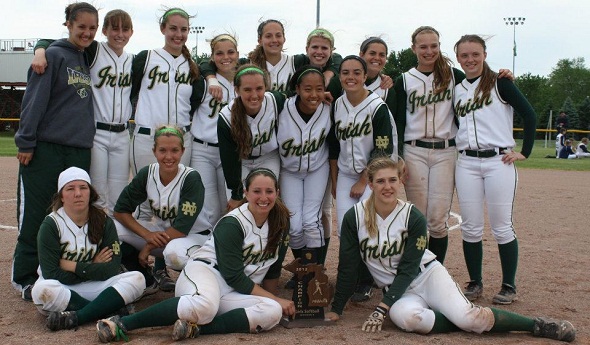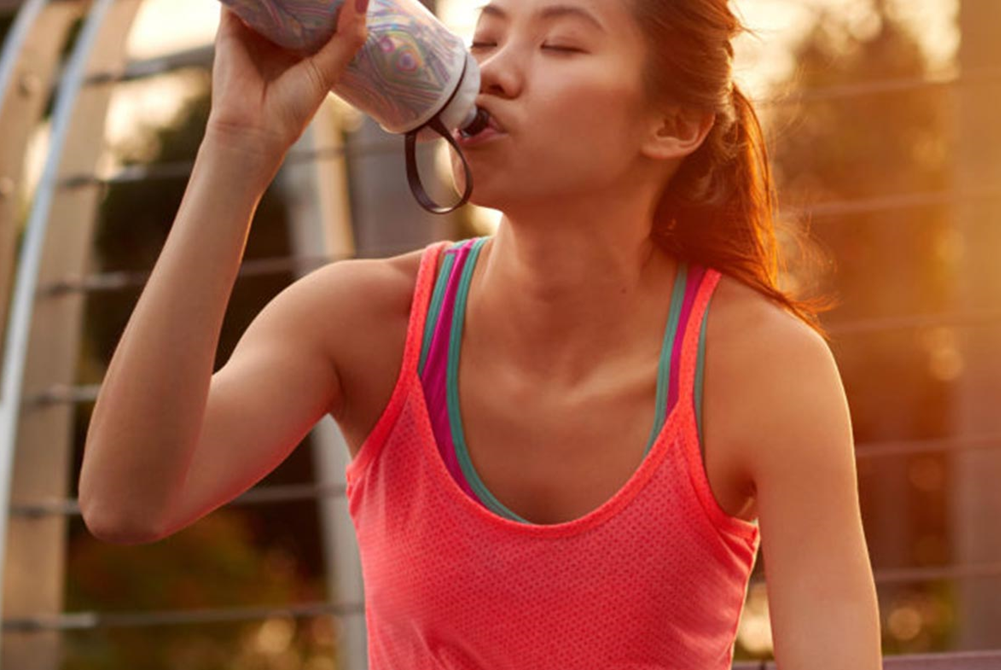
Lots of Fight in Pontiac Notre Dame Irish
June 7, 2012
Last week was the busiest on the MHSAA school schedule. And it was a great one for Pontiac Notre Dame Prep.
Over three days, the Fighting Irish won three District and one Regional championship, plus two more track and field individual Finals titles.
Successes were celebrated across six sports.
Thursday: Notre Dame’s boys golf team won its District, led by individual medalist Aaron Knutson; the senior shot a 71.
Friday: The boys lacrosse team won its third straight Regional title with an 11-2 win over Warren DeLaSalle in Division 2. (The Irish since have lost to Grand Rapids Forest Hills Central in a Semifinal.)
Saturday: Senior Sara Barron finished an outstanding track career by winning the 1,600-meter run with a Division 2 Finals record time of 4:51.67. She also won the 800 in 2:15.83 and teamed with Taylor Timko, Sarah LewAllen and Candice Mark to finish third in the 1,600 relay.
Timko also scored the game-winning goal as Notre Dame’s girls soccer team beat Detroit Country Day 1-0 in a Division 3 District championship game.
The Irish’s softball team beat Bloomfield Hills Lahser and Detroit Country Day by a combined score of 25-1 to win its sixth straight District title. Notre Dame had only one error on the day and didn’t give up a hit in the five-inning win over Lahser.
Finally, the girls tennis team posted its best MHSAA Finals finish to cap its best season ever. Notre Dame placed seventh in Division 4, keyed by runner-up finishes by Erin Moncrief (No. 4 singles) and Maddie Riley and Gabby Bering (No. 4 doubles). Notre Dame ended with a 10-1 dual record, losing only to eventual Division 4 champion Bloomfield Hills Academy of Sacred Heart.
PHOTO: Pontiac Notre Dame Prep’s softball team won its sixth-straight District championship Saturday. (Photo courtesy of Lynn Wroubel).

How To Stay Hydrated: 7 Tips For An Active Summer
By
Nick Parkinson, M.Ed., AT, ATC, TSAC-F
Henry Ford Health
June 4, 2024
Not only is water an essential nutrient, it makes up your entire being. We’re 40 to 70 percent water, depending on fitness level and age. And while staying hydrated is always important, it may become more challenging as the weather heats up. Hard-working muscles generate more heat when they’re surrounded by hot air, making it harder for your body to maintain a normal temperature.
 Even a 1 to 2 percent loss of body weight from water can compromise your performance and impact your body’s ability to cool itself. The heart pumps harder, circulation slows and muscles fatigue more quickly. If the loss creeps up to 3 or 4 percent, you’ll be at increased risk of developing heat-related illness and injury, including cramps, heat exhaustion and heat stroke.
Even a 1 to 2 percent loss of body weight from water can compromise your performance and impact your body’s ability to cool itself. The heart pumps harder, circulation slows and muscles fatigue more quickly. If the loss creeps up to 3 or 4 percent, you’ll be at increased risk of developing heat-related illness and injury, including cramps, heat exhaustion and heat stroke.
Even when you’re not active, your body loses more than a quart of water every day through urine, perspiration, sweat and breath, according to the National Institutes of Health. And most days, it’s more than 2.5 quarts.
The goal, of course, is to replace what’s lost. And with a little planning and preparation, you can during any outdoor activity, no matter what the thermometer says. Here’s how:
- Drink before you’re thirsty. Need to quench your thirst? Chances are you’re already dehydrated. Your best defense against dehydration is drinking water on a consistent basis so you never reach the point of thirst.
- Take frequent water breaks. While you might not want to disrupt your workout for a water break, taking time out for some much-needed liquid nourishment will pay off in the long run. Drink 8 to 10 ounces of water (about one full glass) before starting any activity. Once the games begin, drink another 7 to 10 ounces every 20 to 30 minutes.
- Track your intake. Many people don’t know how much water they should drink daily—or even how much water they’re typically downing. If you’re sipping on a 16-ounce bottle, drink eight of them each day—and even more if you’re exercising heavily.
- Consider an electrolyte drink. Working out for more than an hour? Consider sipping a sports drink—or nibbling on some pretzels or a banana to restore lost electrolytes (minerals in the blood that regulate bodily systems). Your body loses important electrolytes like sodium, potassium and chloride when you sweat. A good sports drink can help you replenish them. Coconut water is a great choice, but there are a slew of healthy, low-sugar options on the market.
- Munch on water-rich produce. Water-packed snacks, including melon, berries, bell peppers and grapes, are all good options. A bonus: All of these foods boast a decent hit of electrolytes, too!
- Step on the scale. Weigh yourself before and after a workout. If the scale shows a loss, replenish it with water (gulp 20 to 24 ounces of water for every pound lost). If you’ve lost 3 percent or more of your body weight, chances are you’re severely dehydrated.
- Watch your urine stream. It may seem gross, but checking your pee is probably the best way to determine whether you’re dehydrated. If it looks like watered down, colored lemonade, you’re probably in the clear. But if it’s a deep yellow or light orange, you’re probably not drinking enough fluids.
Keep in mind that heat exhaustion happens quickly—especially during summer activities. It can easily turn into heat stroke, a dangerous condition that can lead to organ damage, seizures, coma and even death. If you feel dehydrated, dizzy or overheated, get out of the sun, sip some water (slowly) and apply cooling compresses to your head, neck and chest. If your symptoms don’t improve quickly, get to a doctor or call 9-1-1.
Nick Parkinson, M.Ed., AT, ATC, TSAC-F, is the supervisor of athletic training and sports performance at Henry Ford Health. Learn more about Nick.
To find a sports medicine provider at Henry Ford Health, visit henryford.com/athletes or call 313-651-1969.

